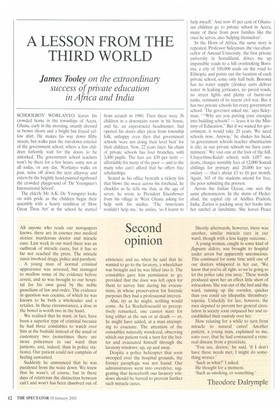Second opinion
AS anyone who reads our newspapers knows, there are in essence two medical stories: murderous doctor and miracle cure. Last week in our ward there was an outbreak of miracle cures, but it has so far not reached the press. The miracle cures involved drugs, police and paralysis.
A young man of normal criminal appearance was arrested, but managed to swallow some of the evidence before arrest, and so was brought to our hospital for his own good by the noble guardians of law and order. The evidence in question was cocaine, of which he was known to be both a wholesaler and a retailer. In these circumstances, a dose in the bowel is worth two in the hand.
We realised that he must, in fact, have been a superior type of criminal because he had three constables to watch over him at the bedside instead of the usual or customary two (sometimes there are more policemen in our ward than patients, and, indeed, than in police stations). Our patient could not complain of feeling unwanted.
Suddenly he announced that he was paralysed from the waist down. We knew that he wasn't, of course, but in these days of relativism the distinction between can't and won't has been dissolved out of existence; and so, when he said that he wanted to go to the lavatory, a wheelchair was brought and he was lifted into it. The constables gave him permission to go, provided that the door was left open for them to survey him during his evacuations, in whose preservation for forensic purposes they had a professional interest.
Alas, try as he might, nothing would come. As La Rochefoucauld so perceptively remarked, one cannot stare for long either at the sun or at death — or, he might have added, at a man attempting to evacuate. The attention of the constables naturally wandered, observing which our patient took a turn for the better and evacuated himself through the lavatory windows: up, up and away.
Despite a police helicopter that soon swooped over the hospital grounds, the former paraplegic was not found. Our administrators went into overdrive, suggesting that henceforth our lavatory windows should be barred to prevent further such miracle cures. Shortly afterwards, however, there was another, similar miracle cure in our ward, though with a less happy outcome.
A young woman, caught in some kind of flagrante delicto, was brought to hospital under arrest but apparently unconscious. This continued for some time until one of our doctors whispered in her ear, 'We know that you're all right, so we're going to let the police take you away.' These words produced upon her an effect little short of miraculous. She was out of the bed and the ward, running up the corridor, quicker than you could say idiopathic thrombocytopenia. Unluckily for her, however, the men deputed to prevent her general circulation in society soon outpaced her and reestablished their custody over her.
How relaxing for a while to turn from miracle to natural cures! Another patient, a young man, explained to me, sotto voce, that he had contracted a venereal disease from a prostitute.
'You see, doctor,' he said, If I don't have these needs met, I might do something worser.'
'Such as what?' I asked.
He thought for a moment.
'Such as smoking, or something.'
Theodore Dalrymple


























































 Previous page
Previous page